Zensar – A Transformation Case Study at Harvard Business School

Harvard University is awe-inspiring. The oldest university in the US exudes an air of establishment and great minds. It’s post-Spring Break in April and near the close of the current academic year, the campus feels alive. Cambridge, Massachusetts is chillier than I expected. Recent rains will soon prove their value by way of new buds on the massive trees.
I came here at the invitation of Professor Joseph Fuller, Professor of Management Practice at Harvard Business School, to participate in a classroom discussion of his case study on Zensar. The case study was examined in class. On behalf of our entire company, I had the distinct privilege and honor to participate in three back-to-back classes. Bright, discerning students discussed, deliberated and questioned several aspects of change, succession and the roadmap to transformation for our company. Interacting with students and listening to them for over four hours was absolutely riveting and greatly enriching.
Just as I hoped, my footsteps did indeed echo down the established university corridor as I made my way to Room 209 in Aldrich Hall. Professor Fuller and I chatted as students arrived for class. The students, approximately one hundred and fifty over three classes, were exceptionally engaged in class. Discussions were sharp, astute and lively. Professor Fuller’s opening comments detailed Zensar’s shift in direction after I became CEO & MD. He also called out successions from the previous CEO, the culture of the company, the changes we’d made and the options and choices available to us. Transitions happen in business every day, of course, but the challenge here was how to transform a tightly-knit, family-like work environment into an organization of empowered employees creating the new and next phase of Zensar through living digital — without losing the original good qualities. Those original qualities could act as a launch pad for even greater things for employees. They were important to preserve.
The case study focused on the transition period up to April 2016, roughly four months after I joined Zensar. Students were asked to provide input on where a new CEO should focus efforts, what changes should be addressed and what choices should be made. The class discussed the culture of the organization and gave weight to the close-knit vibe. Students debated the most effective and appropriate pace of change to come. They deliberated the hiring of new talent from outside Zensar. They even discussed whether I should be India-based or continue to live in the US! Professor Joe Fuller and Tanvi Deshpande co-authored the case study, working on it for close to 8 months. They produced a comprehensive case study that made for spirited, interactive discussion. Professor Amy C. Edmondson, Novartis Professor of Leadership and Management, also took the case study for her class. I was fortunate to be a part of those discussions as well.
It’s important for organizations to have an identity and a sense of purpose. It’s equally key to ensure that organizations live that daily in the way they plan, invest, grow, measure and learn. For us at Zensar, it was vital that we transform our own company into a one hundred percent living digital company first — we had to walk the walk. Reinventing a fifty-four-year-old publicly listed company had its own challenges of change management. Given those challenges and the opportunities created for our employees by upskilling them on new technologies, we chose to make those changes ourselves. We owed it to our people to enable everyone to succeed. This was a win-win.
Our first initiative was our internal mobile app, ZenVerse. I took charge as CEO and MD thirty days after joining Zensar. We launched ZenVerse on day one. ZenVerse is a platform allowing any Zensarian to ask a question directly to me. In almost all cases, I answer these questions myself. All employees can see the questions, my answers and can comment with their own feedback. They can even like it or dislike it. In case I need one of my leaders to add more to the answers I provide, or if I simply don’t have an answer, I tag one of the leaders in the company to add or provide the answer. When I travel to various offices, meet our employees and attend events, I take pictures or video with my iPhone and post them for everyone to see what’s going on with their workmates around the world. With global operations and our people around the world, this is one way of getting to know everyone. We have sentimental analytics on ZenVerse calling out areas where conversations are taking place on a real-time basis. This drives transparency and accountability. ZenVerse was the first digital platform we launched and has become an integral, positive part of our company. Over the last two years we have built thirty different digital platforms with over four hundred and thirty releases. The planning and level of work that have gone into these digital platforms are testaments to a willingness to move forward and be adaptable. A company’s culture is its identity. It’s important to foster it. Zensarians have enabled change that is both home grown and world class.
April is a lovely time on the Harvard campus, no doubt. It feels promising. Between the broad discussions with the students and recalling the accomplishments we made internally at Zensar, I am reminded of the complex grace on display when people come together to discuss, devise, solve and build. Many thanks to the gracious, gifted professors and the engaged students. Thank you for the conversation — and for the reminder that accomplishments made at home are the most valuable.